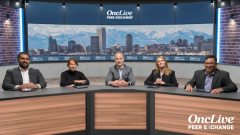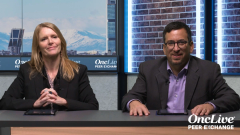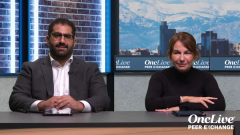
TROPION-Lung01: Dato-DXd in Previously Treated Advanced NSCLC
Solange Peters, MD, PhD, reviews key data from TROPION-Lung01 investigating datopotamab deruxtecan (Dato-DXd) in patients with previously treated advanced non–small cell lung cancer.
Episodes in this series

This is a synopsis of a Peer Exchange video series featuring Benjamin P. Levy, MD, of Sidney Kimmel Comprehensive Cancer Center at Johns Hopkins; Solange Peters, MD, PhD, of University Hospital of Lausanne; Joshua K. Sabari, MD, of NYU Langone’s Perlmutter Cancer Center; Edward B. Garon, MD, MS, of UCLA Jonsson Comprehensive Cancer Center; and Marina Chiara Garassino, MD, of University of Chicago Medicine Comprehensive Cancer Center.
Dr Levy notes that while immunotherapy has improved first-line NSCLC [non–small cell lung cancer] outcomes, there remains only 1 approved second-line regimen: docetaxel with or without ramucirumab. Many trials have tried unsuccessfully to outperform docetaxel. Dr Peters concurs, stating recent failed trials with various immunotherapies and chemotherapies highlight docetaxel’s ongoing role as the second-line standard of care.
They discuss promising data from an abstract of the TROPION-Lung01 trial comparing the antibody-drug conjugate datopotamab deruxtecan to docetaxel in previously treated patients with NSCLC. Dr Peters explains the trial showed statistically significant improvement in progression-free survival from 3.7 to 4.4 months overall, and 3.7 to 5.6 months in the pre-planned non-squamous subgroup analysis. Response rate also nearly doubled from 13% to 26%. Toxicity profiles differ, but serious adverse events were lower with datopotamab deruxtecan.
In summary, Dr Peters feels these efficacy and toxicity findings support datopotamab deruxtecan as a new competitor to docetaxel in the second-line NSCLC setting that is likely to be adopted into clinical practice. Dr Levy agrees this is an important advance for patients progressing after first-line therapy.
*Video synopsis is AI-generated and reviewed by OncLive editorial staff.







































